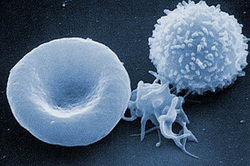Given the opportunity to compete at a high level, would you give it a shot?
IBM Supercomputers have beaten the greatest chess players on Earth, once in a while.
Now, they've built one to conquer JEOPARDY! http://www.wired.com/epicenter/2011/02/watson-jeopardy/Named WATSON, after the Sherlock Holmes' character, this computer can read text and give answers in lightning speed. This computer is going to play against the two best JEOPARDY contestants ever, tonight! What do you think? Is this either: cool, awesome, scary, terrifying, weird or shocking? Why?
For some context, here is a a video clip that explains it.
You and I share recent common ancestors with chimpanzees. We share more distant common ancestors with monkeys. We share still more distance common ancestors with lions, crocodiles, octopi and palm trees.
Our task for the next few weeks to wrap our heads around this startling truth.
There will be many things in this video that you will scratch your head at in confusion. Darwin? Who is that guy? What did he do? What is natural selection?
Hopefully, we will begin to understand why the 'secrets of evolution are Time and Death.'
We will examine "the unbroken thread that stretches from those first cells, to us."
In these few weeks, we will work to understand how and why organisms change over time.
What are some questions you have surrounding this complex but fundamental issue?
...but there are many, many types of cells that do specialized things.
Using Google, look up some of the differences between Plant and Animal cells. List as many as you can find.
You're comments will not show up until I have read them first, so do not worry if they do not automatically appear.
From left to right, this is a picture of a red blood cell, a platelet, and a white blood cell. What do you already know about cells? What do you want to learn about cells? Based on what you do already know about cells, is there anything that you find totally fascinating?
